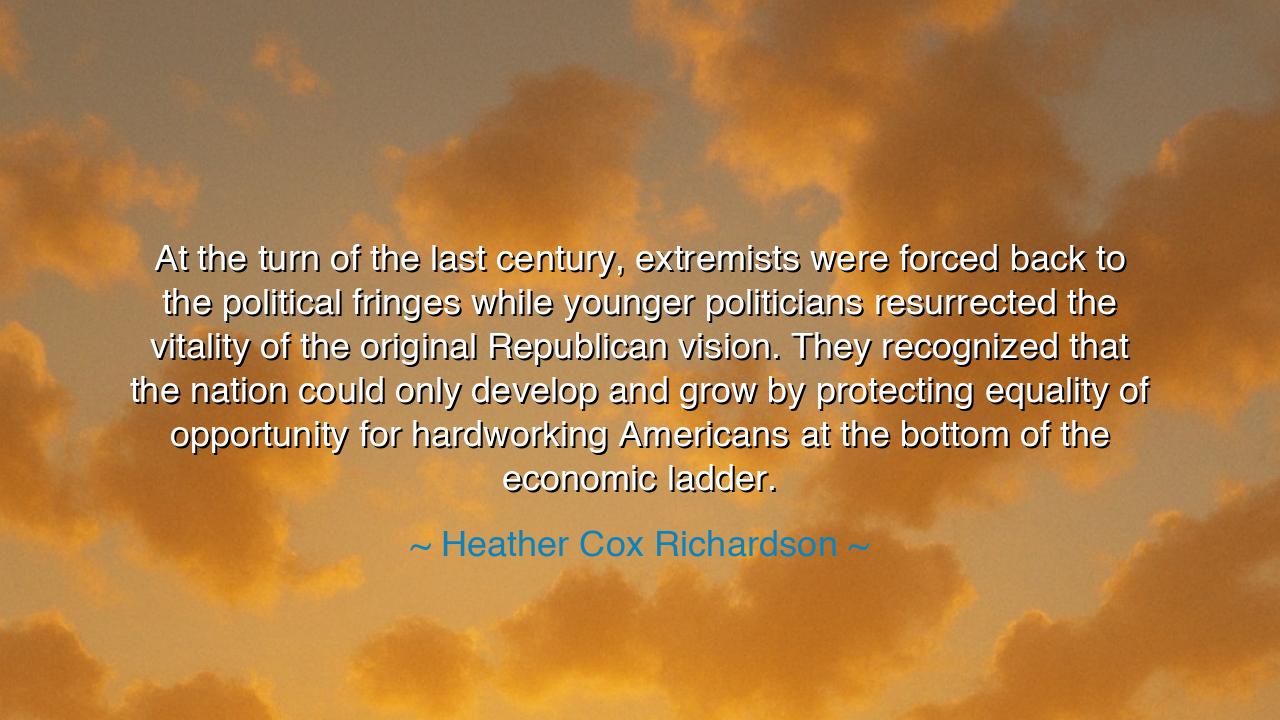
At the turn of the last century, extremists were forced back to
At the turn of the last century, extremists were forced back to the political fringes while younger politicians resurrected the vitality of the original Republican vision. They recognized that the nation could only develop and grow by protecting equality of opportunity for hardworking Americans at the bottom of the economic ladder.






“At the turn of the last century, extremists were forced back to the political fringes while younger politicians resurrected the vitality of the original Republican vision. They recognized that the nation could only develop and grow by protecting equality of opportunity for hardworking Americans at the bottom of the economic ladder.” — Thus wrote Heather Cox Richardson, a historian whose pen wields both clarity and conscience. In her words lies the echo of an age long past yet eternally familiar — a time when democracy stood trembling between the forces of greed and justice, when the heart of a nation had to choose once again what kind of future it would build. Her reflection is not a mere retelling of history, but a moral meditation: a reminder that the health of a republic depends not on wealth or conquest, but on the protection of opportunity for those who labor unseen at its foundation.
To understand this quote, one must return to the dawn of the 20th century, a time of vast transformation in America. The Gilded Age had left behind cities glinting with luxury while millions toiled in poverty. Great fortunes rose, yet fairness fell. The promise of equality of opportunity, once at the core of the Republican vision of Abraham Lincoln, seemed buried beneath the iron weight of monopolies and corruption. Into this world came a generation of reformers — men and women who remembered the original creed of the republic: that government exists not to enrich the few, but to safeguard the many. These younger politicians, whom Richardson evokes, sought to revive the spirit of fairness, to drive back the extremists who had turned politics into a weapon for self-interest.
The Republican vision she speaks of was born in an earlier struggle — in the 1850s, when the party rose from the ashes of division to defend the Union and declare that liberty and labor were sacred twins. But as the years passed, that vision dimmed. By the end of the 19th century, the language of opportunity had been co-opted by industrial magnates and party bosses. The powerful spoke of “freedom” even as they exploited workers and silenced dissent. It was then, Richardson reminds us, that a new generation — the Progressives — rekindled the old flame. They fought for antitrust laws, for workers’ rights, for the regulation of industry, and for the simple yet revolutionary idea that a nation thrives when its poorest citizens have the chance to rise.
Consider the life of Theodore Roosevelt, whose name still rings like a trumpet through that era. He stood not as a destroyer of wealth, but as its moral steward, declaring that unchecked power — whether in the hands of government or corporation — was a threat to the republic itself. “A great democracy,” he said, “has got to be progressive, or it will soon cease to be great.” In his leadership, we see the embodiment of Richardson’s words: the vitality of the nation reborn not through revolution, but through renewal — through a return to the founding ideal that justice must lift from the bottom upward, not trickle down from the top.
This lesson, however, is not chained to history. Every age must face its own extremists, those who seek to divide, to hoard, to twist power toward selfish ends. Richardson’s insight is a warning to all generations: that prosperity without fairness is hollow, and that liberty without opportunity becomes a lie. The nation can only grow, she writes, when it protects its laborers, its dreamers, its small farmers and shopkeepers, its teachers and builders — the humble multitude upon whose sweat the empire of the powerful stands. When they are uplifted, all are uplifted; when they are crushed, all eventually fall.
Let the modern reader see in these words a mirror. The struggle she describes is not confined to the past but reborn in every age when inequality widens and cynicism takes root. It is the duty of every citizen, not just the politician, to resurrect the vitality of justice — to demand that the system serve the common good. When we defend the rights of the working, when we open doors for the poor, when we ensure that the ladder of opportunity remains steady for all, we honor the oldest promise of democracy itself: that merit, not privilege, shall shape destiny.
And so, O seeker of wisdom, take this teaching to heart. Beware the extremes that would pit brother against brother, that exalt wealth above worth or creed above compassion. Seek leaders who are not swayed by profit but guided by principle. Uphold the equality of opportunity in your own life — in how you vote, how you work, and how you treat others. For as Heather Cox Richardson reminds us, the true strength of a nation lies not in its armies or its riches, but in its moral courage to defend the least of its people. Only then can a society claim to be not merely prosperous, but just — not merely great, but good.






AAdministratorAdministrator
Welcome, honored guests. Please leave a comment, we will respond soon